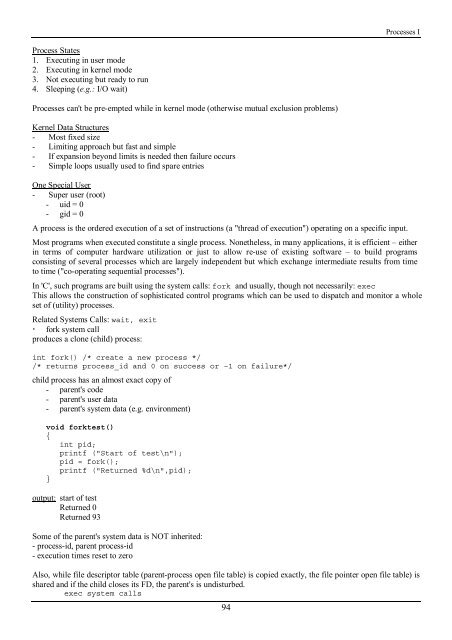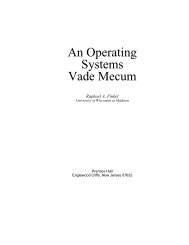You also want an ePaper? Increase the reach of your titles
YUMPU automatically turns print PDFs into web optimized ePapers that Google loves.
Processes I<br />
Process States<br />
1. Executing in user mode<br />
2. Executing in kernel mode<br />
3. Not executing but ready to run<br />
4. Sleeping (e.g.: I/O wait)<br />
Processes can't be pre-empted while in kernel mode (o<strong>the</strong>rwise mutual exclusion problems)<br />
Kernel Data Structures<br />
- Most fixed size<br />
- Limiting approach but fast and simple<br />
- If expansion beyond limits is needed <strong>the</strong>n failure occurs<br />
- Simple loops usually used to find spare entries<br />
One Special User<br />
- Super user (root)<br />
- uid = 0<br />
- gid = 0<br />
A process is <strong>the</strong> ordered execution of a set of instructions (a "thread of execution") operating on a specific input.<br />
Most programs when executed constitute a single process. None<strong>the</strong>less, in many applications, it is efficient – ei<strong>the</strong>r<br />
in terms of computer hardware utilization or just to allow re-use of existing software – to build programs<br />
consisting of several processes which are largely independent but which exchange intermediate results from time<br />
to time ("co-operating sequential processes").<br />
In 'C', such programs are built using <strong>the</strong> system calls: fork and usually, though not necessarily: exec<br />
This allows <strong>the</strong> construction of sophisticated control programs which can be used to dispatch and monitor a whole<br />
set of (utility) processes.<br />
Related Systems Calls: wait, exit<br />
! fork system call<br />
produces a clone (child) process:<br />
int fork() /* create a new process */<br />
/* returns process_id and 0 on success or –1 on failure*/<br />
child process has an almost exact copy of<br />
- parent's code<br />
- parent's user data<br />
- parent's system data (e.g. environment)<br />
void forktest()<br />
{<br />
int pid;<br />
printf ("Start of test\n");<br />
pid = fork();<br />
printf ("Returned %d\n",pid);<br />
}<br />
output: start of test<br />
Returned 0<br />
Returned 93<br />
Some of <strong>the</strong> parent's system data is NOT inherited:<br />
- process-id, parent process-id<br />
- execution times reset to zero<br />
Also, while file descriptor table (parent-process open file table) is copied exactly, <strong>the</strong> file pointer open file table) is<br />
shared and if <strong>the</strong> child closes its FD, <strong>the</strong> parent's is undisturbed.<br />
exec system calls<br />
94
















